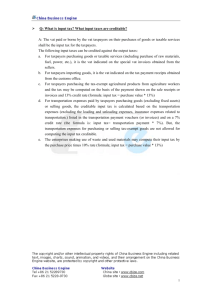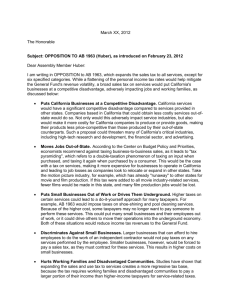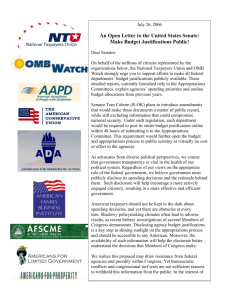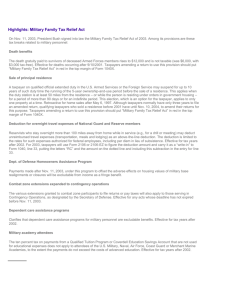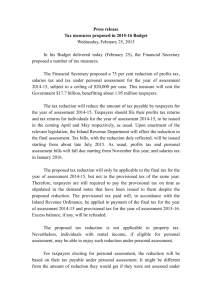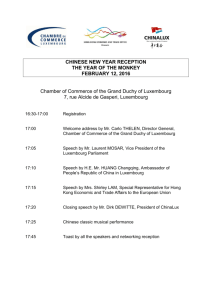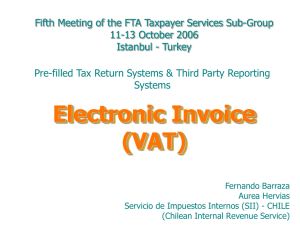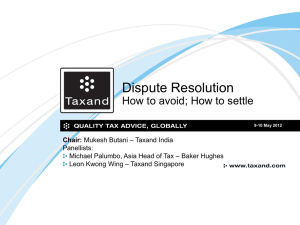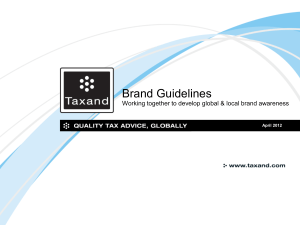Access further information on the Chilean Tax Reform Bill
advertisement
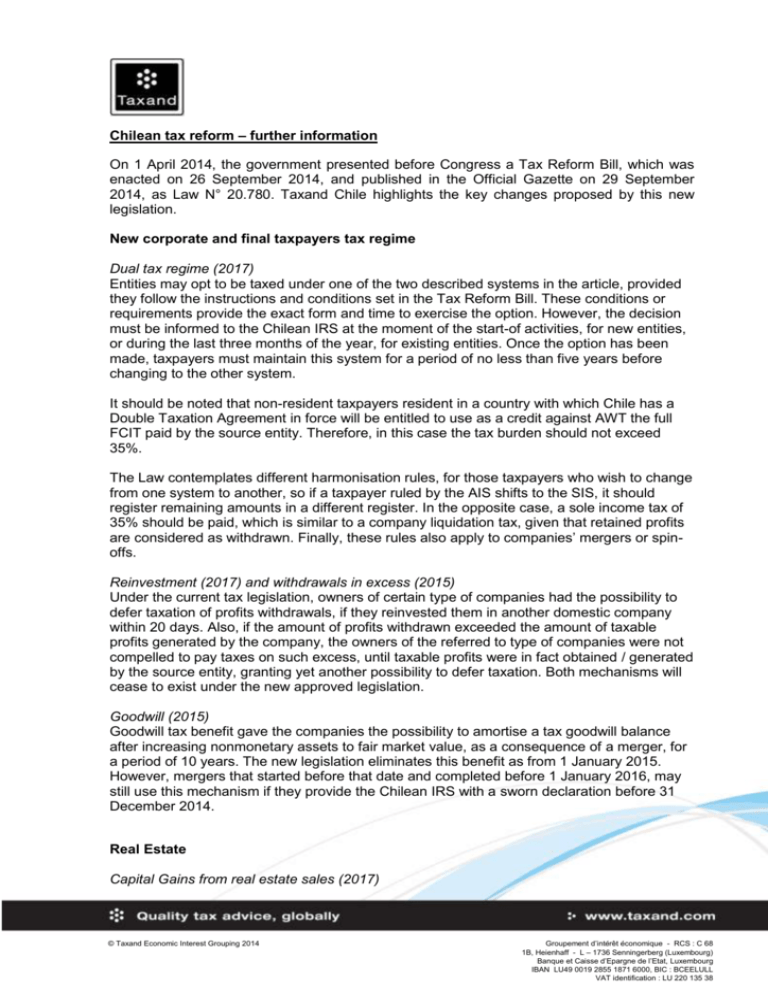
Chilean tax reform – further information On 1 April 2014, the government presented before Congress a Tax Reform Bill, which was enacted on 26 September 2014, and published in the Official Gazette on 29 September 2014, as Law N° 20.780. Taxand Chile highlights the key changes proposed by this new legislation. New corporate and final taxpayers tax regime Dual tax regime (2017) Entities may opt to be taxed under one of the two described systems in the article, provided they follow the instructions and conditions set in the Tax Reform Bill. These conditions or requirements provide the exact form and time to exercise the option. However, the decision must be informed to the Chilean IRS at the moment of the start-of activities, for new entities, or during the last three months of the year, for existing entities. Once the option has been made, taxpayers must maintain this system for a period of no less than five years before changing to the other system. It should be noted that non-resident taxpayers resident in a country with which Chile has a Double Taxation Agreement in force will be entitled to use as a credit against AWT the full FCIT paid by the source entity. Therefore, in this case the tax burden should not exceed 35%. The Law contemplates different harmonisation rules, for those taxpayers who wish to change from one system to another, so if a taxpayer ruled by the AIS shifts to the SIS, it should register remaining amounts in a different register. In the opposite case, a sole income tax of 35% should be paid, which is similar to a company liquidation tax, given that retained profits are considered as withdrawn. Finally, these rules also apply to companies’ mergers or spinoffs. Reinvestment (2017) and withdrawals in excess (2015) Under the current tax legislation, owners of certain type of companies had the possibility to defer taxation of profits withdrawals, if they reinvested them in another domestic company within 20 days. Also, if the amount of profits withdrawn exceeded the amount of taxable profits generated by the company, the owners of the referred to type of companies were not compelled to pay taxes on such excess, until taxable profits were in fact obtained / generated by the source entity, granting yet another possibility to defer taxation. Both mechanisms will cease to exist under the new approved legislation. Goodwill (2015) Goodwill tax benefit gave the companies the possibility to amortise a tax goodwill balance after increasing nonmonetary assets to fair market value, as a consequence of a merger, for a period of 10 years. The new legislation eliminates this benefit as from 1 January 2015. However, mergers that started before that date and completed before 1 January 2016, may still use this mechanism if they provide the Chilean IRS with a sworn declaration before 31 December 2014. Real Estate Capital Gains from real estate sales (2017) © Taxand Economic Interest Grouping 2014 Groupement d’intérêt économique - RCS : C 68 1B, Heienhaff - L – 1736 Senningerberg (Luxembourg) Banque et Caisse d’Epargne de l’Etat, Luxembourg IBAN LU49 0019 2855 1871 6000, BIC : BCEELULL VAT identification : LU 220 135 38 Chilean resident individuals Non-taxable income regime is eliminated except for Chilean resident individuals subject to GCT, in which case the benefit is maintained but capped at 8,000 UF1 (Foment Units, app. USD 330,000) regardless of how many sales this taxpayer may execute or the number of real estate he/she may own. Improvements informed to Chilean IRS should be considered as part of the acquisition cost. Capital gain that exceeds 8,000 UF could be subject to a 10% sole tax on a cash basis, or to the same taxation applicable to the sale of shares. For the case of inherited properties, there is a tax credit for the estate tax paid. In order to determine the higher value of properties acquired before the Law becomes in force, there are different mechanisms: Adjusted acquisition value including previously informed improvements Fiscal Appraisal for 1 January 2017 readjusted to the month before selling Commercial value, before the Law is published, should be previously informed to Chilean IRS before 31 December 2015 For real estate acquired before 1 January 2004, higher value will be considered as nontaxable income, as it is established under the current tax law. Other taxpayers Higher Value = Sale Price - Readjusted Acquisition Cost Higher value is always profitable income, and improvements are considered as part of acquisition costs only for FCIT taxpayers, not for AWT taxpayers. Presumptive income for agricultural taxpayers (2016) The limit for agricultural taxpayers to be ruled by this regime is noticeably reduced from 8,000 UTA2 (app. USD 7,000,000) to 9,000 UF (app. USD 370,000). Taxpayers that do not comply with all the legal requirements to apply for this regime must declare their effective income, determined with full accounting records even if their annual net sales do not exceed 1,000 UTM3. Therefore, agricultural companies having other companies as shareholders cannot be subject to the presumptive income under the Law. UF (Unidad de Fomento) is an economical unit, referring to an inflation-free currency given on a monthly basis 2 UTA (Unidad Tributaria Anual) is an economical unit, referring to an inflation-free currency given on a yearly basis. Currently 1 UTA is equal to CLP 507,648. 3 UTM (Unidad Tributaria Mensual) is an economical unit, referring to an inflation-free currency given on a monthly basis. Currently 1 UTM is equal to CLP 42,304. 1 © Taxand Economic Interest Grouping 2014 Groupement d’intérêt économique - RCS : C 68 1B, Heienhaff - L – 1736 Senningerberg (Luxembourg) Banque et Caisse d’Epargne de l’Etat, Luxembourg IBAN LU49 0019 2855 1871 6000, BIC : BCEELULL VAT identification : LU 220 135 38 Value Added Tax (2016) Starting January 2016, the sale of real estate made on a habitual basis will always be levied with VAT, excluding the land, regardless of the condition of construction company of the seller. For this purpose, the approved Law defines the concept of “habitual basis”. Therefore, if any person or entity sells a property and falls under the given definition, the VAT should be applied. Also, the legislation reduces the special VAT benefit for construction companies contained in Decree Law 910. Your Taxand contact for further queries is: Carola Trucco T. +56 2 378 8933 E. ctrucco@bye.cl © Taxand Economic Interest Grouping 2014 Groupement d’intérêt économique - RCS : C 68 1B, Heienhaff - L – 1736 Senningerberg (Luxembourg) Banque et Caisse d’Epargne de l’Etat, Luxembourg IBAN LU49 0019 2855 1871 6000, BIC : BCEELULL VAT identification : LU 220 135 38
